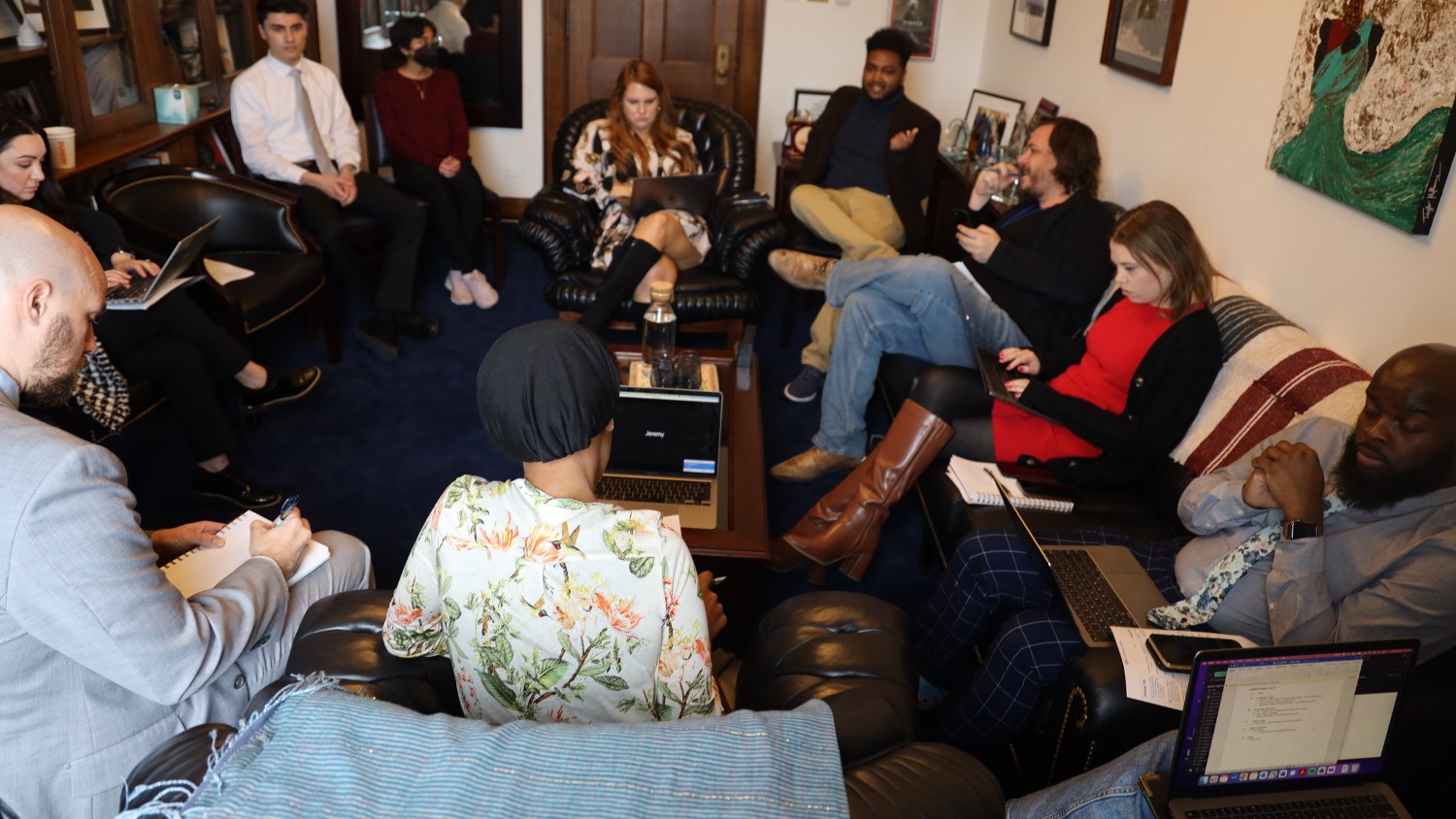
Navigating hate and death threats: What it's like working for Ilhan Omar
In Representative Ilhan Omar's office, the answering machine is something of an albatross.
Beneath the daily questions and concerns from constituents, selected praise from the well wishers, and the usual requests for meetings from lobbyists, lies a bottomless pit of hateful messages.
"I'll put a bullet in your f***ing head. I'll f***ing kill you," says one.
"Ilhan Omar!!! You will not be going back to Washington, your life will end before your 'vacation' starts ... They say we can't get the Somali stink out of the clean Minnesota air, but we are going to enjoy the adventure," says another.
On a daily basis, the Black and visibly Muslim legislator is inundated with obscene, racist and hate-filled messages at her Capitol Hill offices.
One congressional aide, who asked not to be named, told Middle East Eye that some of the language in the voicemails were so vicious and outrageous they ought "not to be repeated".
But as is protocol, her staff, made of up mostly women, listen through every single one. Before disconnecting. And narrating them to senior staff. Several senior staff interviewed by Middle East Eye say that four years since Omar came to office, the threats simply won't dissipate.
And while much of the media's attention has naturally focused on Omar, given the threat to her life, the aide admits that the abuse can be difficult for staff to shake off.
The level of hate has become so noxious that a fair share of their work has revolved around developing systems and strategies to protect their younger colleagues, especially the women and men of colour, often on the front lines, to the abuse meted out over the phone, on social media or on the answering machine.
"There have been times where it's been challenging for me personally and depressing to carry these messages," the aide added.
"It definitely has made me disappointed at times, sad that this is the state of our world, and depressed that our interns are also answering those calls," the congressional aide added.
Constant state of worry
In January 2019, Omar became the first Somali-American and one of two Muslim women to be sworn into Congress.
Her meteoric rise to Congress was marked by a commitment to improving the lives and economic opportunities of working-class Americans.
But the moment she entered Congress, she would come to be defined by her trenchant criticism of US militarism and other aspects of US foreign policy.
As a result, she's been the subject of relentless attacks from right-wing commentators, Republicans, and even members of her own Democratic Party.
'Getting a death threat is pretty disturbing. You can't just pick up and pivot and go off and do your work'
- Mona Lena Krook, Rutgers University
As one of the historic progressive entries into Congress known as the Squad, following the election of Donald Trump, Omar became a lightning rod for conservatives.
Her every move scrutinised. Her every comment facing deliberate distortion by conservative media outlets, and Trump himself.
Trump used Omar as the very embodiment of the enemy that had to be defeated for him to "Make America Great Again".
"She would like to make the government of our country just like the country from where she came - Somalia. No government, no safety, no police, no nothing, just anarchy," Trump said in one of his rants about the US lawmaker in 2020. In other barb, he called her a "hate-filled, America-bashing socialist".
Omar's aides declined to get into specifics, but told MEE that the representative had received thousands of threats since entering office in 2019.
Omar said at the time that Trump's vitriol had directly led to an increase in death threats.
In December 2021, Omar publicly shared an example of a message received by the office which she blamed emphatically on Republican rhetoric.
"We see you, you Muslim sand n***** b****," the message began.
"Don't worry, there are plenty who would love the opportunity to take you off the face of this f***ing earth," the voicemail continued. "You will not live much longer b****, I can almost guarantee you that."
The threat was one of several Omar publicly shared.
'Historically high'
Threats against members of Congress have risen sharply in recent years, according to data provided by the United States Capitol Police, a law enforcement agency charged with protecting US legislators.
In October, Reuters reported that cases related to "concerning statements and threats" increased from 3,939 in 2017 to 9,625 in 2021.
The Capitol Police told MEE that for security reasons it can't divulge information regarding specific threats against members of Congress, but the number of cases was "historically high".
It added that while the department is expanding its resources to investigate these threats, "continuing to decrease violent political rhetoric across the country is the best way to keep everyone safe".
Connor McNutt, Omar's chief of staff since 2019, told MEE that violent threats were documented and reported to Capitol Police and the Sergeant at Arms, who are in charge of protecting members of Congress, but the entire process was incredibly time-consuming.
"Sadly, reporting these threats, corresponding with Capitol Police and other law enforcement, and communicating with prosecutors is an all too frequent occurrence and a part of my regular - sometimes daily - duties," McNutt said.
"That's not to mention the staff who answer phones throughout the day and have to listen to routinely violent rhetoric or death threats against the Congresswoman."
Mona Lena Krook, an American political scientist based at Rutgers University, told MEE that aides to lawmakers often face the brunt of assaults.
Add in the dimension of America's erratic and toxic gun culture and the fears are in no way exaggerated or unwarranted. And an attack on a member of Congress has happened before.
In 2011, then-US representative Gabby Gifford was shot in the face as she spoke outside Congress. Gifford miraculously survived, and is now a major anti-gun advocate.
Omar's team was naturally horrified in September 2020 to see then-Republican candidate Marjorie Taylor Greene pose with an assault rifle along with images of Omar and her congressional colleagues, Alexandria Ocasio-Cortez and Rashida Tlaib, as part of a campaign ad titled: "Squad's Worst Nightmare".
The inciteful ad leaned directly into right-wing talking points that utilised any opportunity to characterise these three powerful women of colour as outsiders or enemies of the white state.
It also underscored how a candidate like Taylor-Greene - now a sitting member of Congress - was prepared to use violent imagery to oppose their presence in the House.
Taylor-Greene's office did not reply to MEE's request for comment.
Krook says that whereas it was Omar or Tlaib or Ocasio-Cortez's images on the advertisements, it is often their staff members who have to navigate the daily salvos of hate hurled at their bosses.
"Staffers [are] the ones who do a lot of the work. They're drafting the speeches, they're writing the drafts of legislation. I can't imagine the kind of impact it has on their own mental state of having abuse rain down on you," Krook said.
"Getting a death threat is pretty disturbing. You can't just pick up and pivot and go off and do your work," she added.
"It's the kind of thing that sort of nags at you and makes you lose sleep," Krook said.
But the hateful rhetoric spouted on nightly television segments on right-wing television shows like Fox News’s Tucker Carlson had another consequence for Omar's staff: it made their job harder.
Subject of ridicule
McNutt, Omar's chief of staff, said the abuse made it considerably more difficult to get lawmakers from across the aisle to sign onto legislation, even if they believed in it.
"We, probably more than any other Democratic member of Congress, have a harder time getting a Republican to cosponsor legislation with us, even if it's an idea that they support.
"It's just by virtue of not wanting to be on a bill with the congresswoman," he told MEE.
Krook noted that she had worked with Congresswoman Tlaib's office on a resolution opposing violence against women.
In 2021, when Tlaib along with Omar and other women lawmakers tried to get Republican co-sponsors, no other congresswomen joined.
"It was really sad to see that even on that issue, like basic issues like safety of officials, they just couldn't do it," Krook said.
McNutt, who has worked with Omar since 2016, when he joined her team when she was a state legislator in Minnesota, says he knew early on that working with Omar was likely to be eventful.
Barely weeks into his new role as aide to the new and exciting Minnesota legislator, McNutt watched as his new boss would face a dizzying array of personal and professional insults that just didn’t seem to end.
They ranged from false smears to the absurd.
Later they would become terrifying.
Is anyone more hated?
As a state legislator, Omar was accused of marrying her own brother in order to facilitate his US citizenship. She was then accused of financial irregularities in the state legislature.
Both allegations were rubbished by Omar and state officials, and it was assumed they were laid to rest.
But not for the right wing. They were just getting started.
'There is no one on Capitol Hill who has faced as many insults, attacks and censures as Ilhan Omar'
- Connor McNutt, chief of staff for Ilhan Omar
When she became the first refugee to join the US Congress, the rate of threats and attacks on her simply escalated.
"The level of hate we were seeing increased exponentially," McNutt told MEE.
"[She] sort of became this fixation for the right-wing media - your Tucker Carlsons, your Free Beacons, The Examiner. They [turned] her into this caricature of what the right-wing sort of hates.
"There is no one on Capitol Hill who has faced as many insults, attacks and censures as Ilhan Omar," McNutt added.
Fox News did not reply to MEE's request for comment.
The accusation that Omar married her own brother continues to circulate in right-wing circles.
But where these comments looked to dehumanise and ridicule her, she faced an onslaught of other attacks from the right-wing media that made her a target. First, her comments about the September 11, 2001 attacks were distorted to make it seem like she was minimising the incident that killed 3,000 Americans.
Trump even tweeted a video in April 2019 juxtaposing Omar with footage of the twin towers falling. Omar wrote a day later that the tweet had led to an increase in death threats.
Then, her remarks about US militarism and support for Israel were deemed to be anti-American.
It was, however, a remark in February 2019 that members of the US government were being influenced by money from the American Israel Public Affairs Committee (AIPAC) to support the state of Israel that brought the most criticism. Omar was immediately accused of antisemitism.
The pro-Israel lobby is known to spend millions of dollars to influence politics in the US. In the face of mounting pressure from her Democratic Party colleagues, Omar apologised.
"Antisemitism is real, and I am grateful for Jewish allies and colleagues who are educating me on the painful history of antisemitic tropes," Omar said. "At the same time, I reaffirm the problematic role of lobbyists in our politics, whether it be AIPAC, the NRA or the fossil fuel industry," she added.
Trump called her apology "lame" and suggested she resign from the Foreign Affairs Committee.
And the accusations of antisemitism would continue to haunt her. Each time she critiqued Israel, she was accused of “having a problem with Jews".
It was on the basis of this accusation and her support for the Boycott, Divestment, and Sanctions (BDS) movement, a Palestinian civil society movement working to build international opposition to Israel’s illegal occupation and mistreatment of Palestinians that purportedly prompted her ousting from the Foreign Affairs Committee in February this year.
Omar is Muslim, a refugee, a woman, and Black. These provided a perfect recipe for the right wing to rail about.
"She's being targeted for her identity and not for what she did or said," the staff member, who asked to remain anonymous, said.
"It is as if she cannot speak up on American values or on behalf of America or for the rest of the world. People still call every day complaining and wanting her out of Congress just because of her existence as a Black woman," the aide added.
Krook, who has written a book on violence against women in politics, said that "it would be accurate to say that Omar's office receives probably some of the highest levels of threats.
"Part of it is ideological. She's a well-known progressive and unapologetic about it," she said. "But also, I think it has a lot to do with her identity, being a woman, being Muslim, being young, being of refugee background."
The role of the Democratic Party
Several observers noted that while some within the Republican Party and its acolytes have been racist towards Omar, the Democratic Party itself had a lot to answer for.
Writing in the Intercept, Akela Lacy argued that even if the vote had been split along party lines, it was the Democrats who had paved the way for the vote that would oust Omar from the House Committee.
Indeed, her own Democrat colleagues have publicly berated her for her foreign policy remarks and often chosen to stay away from her bills.
"I don’t need any of you to defend me against antisemitism. My friend Ilhan Omar and I have worked together toward the values that I treasure as an American Jew and that she treasures as an American Islamic woman, the only one on the Foreign Affairs Committee," Democratic colleague, Representative Jan Shakowsky, said ahead of the vote.
But when Hakeem Jeffries, the House Minority Leader spoke, he described Omar as having made mistakes including "using antisemitic tropes," referencing her comments in 2019 for which she had apologised at the time. Jeffries added that Omar would learn from her mistakes and pointed out that Republican Party had not disciplined their own members for their own transgressions.
McNutt acknowledged that the Democratic Party had failed her in the past.
He said he would even wager that had the vote for her ousting from the Foreign Affairs Committee taken place in 2019, Omar may not have received the support from the Democratic Party that she did in February.
The unified show of support from the party during this recent impasse showed Omar's team had made in-roads with their colleagues.
"Would we have liked to have our Democratic colleagues react differently in the past? I think we probably would have. But I think, through the work that she and the office, we were able to be really united and have full support from the Democratic Caucus," McNutt said.
"I do think this targeting of her, the spending a million dollars demonising her across the country, has really had a negative impact on how she in our office is perceived here. But that hasn't stopped us from leaning in to have those tough conversations," he added.
'We will keep speaking out'
Since coming into office in 2018, Omar has become known for championing local causes and foreign policy issues that have grated the rank and file of the Republican Party leadership as well as Democratic leaders on the other wing of the party.
Omar's dedication to economic issues has shown itself in her support for Medicare For All, in her calling for housing to be regarded as a human right, and in the expansion of benefits for working-class Americans.
She has criticised the Biden administration on its immigration policies on the southern border and urged the administration to increase the refugee cap. On Capitol Hill, her office staff are among the first to have been unionised in Congress, a move lauded by the Congressional Workers Union.
Her commitment to matters of democratic principles and human rights abroad and at home has seen her spearhead the Stop Arming Human Rights Abusers Act, and call for US President Joe Biden to pardon Daniel Hale, a military analyst who leaked government documents revealing the civilian toll of Washington's drone programme.
She also remains among the few US lawmakers to speak on the declining democratic values in India under Prime Minister Narendra Modi, and has been a vocal proponent against Islamophobia, leading the way with the Combating International Islamophobia Act.
But her close shave with losing out to re-election in 2022 following a very tight primary in Minnesota’s 5th Congressional District has prompted observers to suggest she has decided to "move into the mainstream".
Writing in the Minnesota Reformer, Doug Rossinow argued that Omar’s decision to vote for H.Res.92, a resolution condemning antisemitism and recognizing Israel as an ally, the same day she was ousted from the Foreign Affairs Committee, "mended ties" with the Democratic Party.
The Jewish Telegraphic Agency wrote that Omar’s name was "sandwiched between the names of Reps Brad Schneider and Josh Gottheimer, two of Congress’ most vocal pro-Israel lawmakers."
Omar had previously voted for H.R4373, a foreign aid appropriations bill, containing $3.3bn in military aid to the Israeli government, in July 2021.
But Omar's staff say the Congresswoman has no intention of softening on foreign policy.
“We are always of the mind that we are working hard, but that we can always improve and do better. And I think determining whether it's good faith or bad faith is kind of a holistic approach of where is the criticism or feedback coming from."
Reflecting on his nearly seven years working with Omar, McNutt, from a small rural town in Minnesota, says he initially took the opportunity to work with Omar as a way to shine a light on neglected communities in Minnesota. He has no regrets. “It helps that she is a great boss. Of course, I am biased,” McNutt says with a laugh.
The other staff member who asked not to be named said she too had wanted to work for “somebody who represents my identities and who has the same progressive values that I do.
"That's kind of what inspired me to work for the congresswoman," the staff member said.
Despite being removed from the House Foreign Affairs Committee, Omar remains on the Education Committee and influential Budget Committee, which focuses on government spending and fiscal policy.
According to Jackie Rogers, Omar’s deputy communications director, Omar's removal from the Foreign Affairs Committee only served to highlight her office's work on foreign policy issues.
If anything, it may have just given her team a bigger megaphone.
"This is a priority for her. She has a lived experience that we have raised, she has an important perspective. And we will keep speaking out," Rogers said.
Editor's note: A previous version of this article reported that Omar voted for HR 4373, a foreign aid appropriations bill containing $3.3bn in military aid to the Israeli government, the same day she was ousted from the Foreign Affairs Committee. Omar actually voted for H.Res.92, a resolution condemning antisemitism and recognizing Israel as an ally, on the same day she was removed from the Committee. Omar voted for HR 4373 in July 2021. The article has been adjusted to reflect this.
Middle East Eye propose une couverture et une analyse indépendantes et incomparables du Moyen-Orient, de l’Afrique du Nord et d’autres régions du monde. Pour en savoir plus sur la reprise de ce contenu et les frais qui s’appliquent, veuillez remplir ce formulaire [en anglais]. Pour en savoir plus sur MEE, cliquez ici [en anglais].









